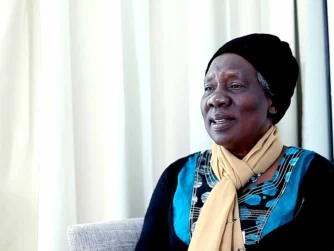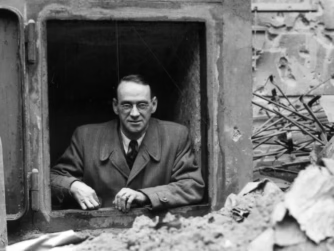Voice 1
Welcome to Spotlight. I’m Christy VanArragon.
Voice 2
And I’m Joshua Leo. Spotlight uses a special English method of broadcasting. It is easier for people to understand – no matter where in the world they live.
Click here to follow along with this program on YouTube.
Voice 1
The woman faced her former prison guard. He and the other guards had done terrible things to her and other women in the prison camp. The guards had beaten the women. They had denied the women food, and medicine. The women had done nothing wrong. They did not deserve this punishment.
Voice 2
But now, years later, the guard had come to her. He was asking her to forgive him. What would she say? How could she answer him? Today’s Spotlight is on this woman, Corrie ten Boom, and her answer.
Voice 1
You may have heard another Spotlight program about Corrie’s father, Casper ten Boom. Casper and his family lived in the Netherlands during World War Two. During that time, the German army controlled that country and many others. They were fighting a war for control of Europe. The German government was also trying to rid these countries of particular groups of people – including the Jews, and Gypsies. They killed millions of people in planned executions, and in prison camps.
Voice 2
The ten Boom family disagreed with these policies. For four years, Casper and his family worked to help Jews and other people in danger. They hid people in their home. They also worked to find safe places for the people to stay – places outside the city where they lived. In this way, they helped to protect more than 80 people.
Voice 1
But finally, in February 1944, the authorities learned of the ten Boom family’s illegal acts. They arrested many members of the family, including Casper, Corrie and her older sister, Betsie.
Voice 2
Casper was very old. He died ten days later in prison. Corrie was 51 years old. Betsie was several years older. The two sisters were held in separate rooms at the prison. They stayed in this prison for several months. Then, in June, the authorities moved both sisters to a prison camp. Here, they were together again. But their situation was about to get extremely difficult.
Voice 1
In September, authorities moved many of the prisoners in the camp. Guards ordered them on to a train. This train was originally designed to carry cows. But now, people filled the cars. They had little food, or water. Finally, they arrived at a prison camp in Germany called Ravensbruck.
Voice 2
Ravensbruck was the largest prison camp for women in Germany. And it was a terrible place. The prisoners had very little food. Guards forced them to work hard. They beat prisoners for any reason. And they also killed many prisoners, by poisoning them with gas.
Voice 1
In the camp, Betsie’s health quickly began to fail. Corrie did everything she could do to protect her sister. She tried to give her extra food. She protected Betsie from the guards, and from difficult work.
Voice 2
Betsie also protected Corrie, but in a different way. Betsie followed their father’s example. The family was Christian. Every day, their father read the Christian Bible with his daughters. They also prayed to God together. It was this faith that caused them to protect people in danger. They were following the example of Jesus Christ. Even in the prison camp, the sisters continued to read their Bible and pray.
Voice 1
However, Corrie was very angry. Instead, Betsie encouraged Corrie to be thankful – even for the little things, and the difficult things. She also encouraged Corrie to forgive. This was the most difficult thing for Corrie. But forgiveness is a central teaching of the Christian faith. Christians believe that God forgives people for the wrong things that they do. They also believe that they must follow God’s example. They must forgive people that do wrong things to them.
Voice 2
Betsie did forgive the guards. However, over the months, Betsie became more and more weak. Finally, in December, she died from sickness and lack of food. Soon after Betsie’s death, the authorities released Corrie. Corrie did not know why they released her at this time, but her prison sentence was complete. She returned home to the Netherlands, without Betsie. Corrie moved back into her father’s house alone.
Voice 1
Corrie felt lost without Betsie. How could she continue? But slowly, she remembered their talks in the prison camp. Betsie had wanted to share a message of forgiveness. And she wanted to open a home to help people damaged by the war.
Voice 2
When the war ended in 1945, Corrie opened a home just like Betsie had wanted to. At first, the people who came were former prisoners. But soon, the home also began to serve Dutch people who worked with the German authorities. These people were now suffering very bad treatment from their communities. And they also suffered deep regret for the things they had done during the war. At first, Corrie found it hard to accept these people. But again, she followed Betsie’s example of forgiveness.
Voice 1
Corrie also began to travel and tell her family’s story. She wrote a book about these experiences. It is called “The Hiding Place”. In it, she tells the story from the beginning of this program.
Voice 2
In 1947, Corrie spoke at a church in Germany. After her speech, a man came to talk to her. He had been a guard at Ravensbruck. However, since then, he had become a Christian. And he deeply regretted the terrible things he had done as a guard. He asked Corrie for forgiveness. He held out his hand, for her to hold. Corrie wrote about her feelings and thoughts in that second:
Voice 3
Forgiveness is not an emotion – I knew that. Forgiveness is an act of the will. The will can work, even if the heart is cold. “Jesus, help me!” I prayed quietly, “I can lift my hand. I can do that much. You supply the feeling.”
Voice 1
So Corrie put her hand into his hand. As she did, something amazing happened. She began to feel a healing emotion – it was forgiveness. It filled her heart. And she began to cry. Corrie wrote about what she said:
Voice 3
“I forgive you brother!” I cried, “With all my heart!” For a long time, we held each other’s hands, the former guard and the former prisoner. I had never known God’s love as deeply as I did then.
Voice 2
Corrie worked with victims of war for the rest of her life. She died in 1983, at the age of 91. Corrie was honored by many governments and Jewish organizations for the work she did. But it was Corrie’s example of forgiveness that brought healing to many people.
Voice 1
The writer of this program was Christy VanArragon. The producer was Michio Ozaki. All quotes were adapted for this program and voiced by Spotlight. You can listen to this program again, and read it, on the internet at www.radioenglish.net. This program is called, ‘A Story of Forgiveness: Corrie Ten Boom’.
Voice 2
Thank you for joining us today. Goodbye.
Question:
Have you ever forgiven someone who did something terrible to you? Why or why not? How did you feel about your decision?








I think I’m not the best person to talk about forgiveness, because I’ve never had tragic experiences, nor do I think I have great enemies, but I think that revenge will never really compensate the victim, nor will it do much to make them feel better. The State, on the other hand, has the duty to punish the guilty, in order to dissuade others from committing the same crime.
Amazing story
We always need to forgive our enemies more than themselves
Because we need to feel it to heal our hearts
So we can live in peace
I can’t hate anyone. Because my heart is so good
Exactly
I decided to forgive because I want her to go away and when these memories are gone in peace then I can live freely
The story it is very nice . I like forgiveness but many people don’t know how to achieve it
It’s not easy to forgive to be honest
I always have a desire for revenge
Honestly, i’m ready to forgive someone who did sth terrible with me because i want them recognizing their mistakes and i have a good heart.